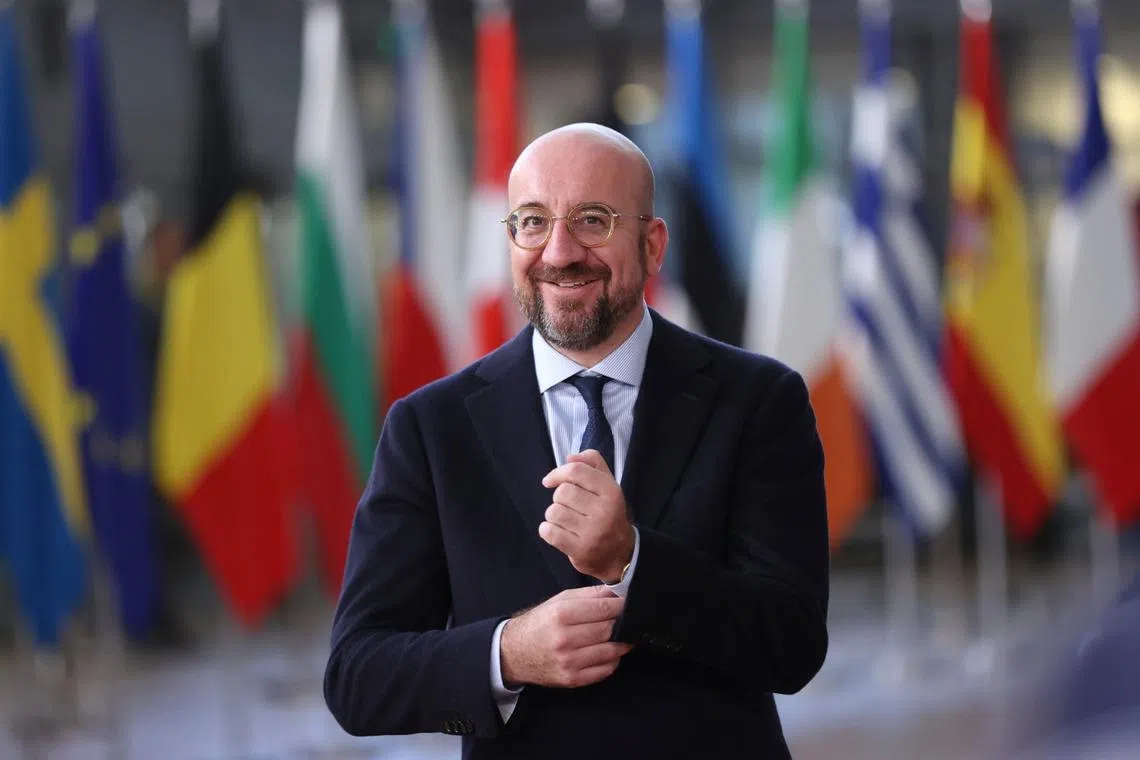EU chief says China must ‘adapt its behaviour’ to resolve trade row
Sign up now: Get ST's newsletters delivered to your inbox

Mr Charles Michel hoped a deal could be struck in the coming days or weeks, but warned that getting there would be tough.
PHOTO: CHARLES MICHEL/FACEBOOK
VIENTIANE - China must “adapt its behaviour” to resolve an escalating tariff row with Europe, European Union chief Charles Michel said on Oct 11, warning of the dangers of the dispute escalating into a full-blown trade war.
The European Council president met Chinese Premier Li Qiang on the margins of a South-east Asian summit in Laos as Beijing and the EU impose tit-for-tat penalties on each other’s imports in a row over subsidies and protectionism.
Mr Michel said in an interview with AFP that after his “frank and candid” talks with Mr Li, he hoped a deal could be struck in the coming days or weeks – but he warned that getting there would be tough.
“I have the impression that the door is not closed, but it’s a very difficult situation, it’s very challenging,” he said.
“We count on China to adapt its behaviour and to understand that we have to rebalance the economic relationships for more fairness, for fair competition, for a more level playing field.”
China and the 27-member bloc are bitterly at odds over Beijing’s generous subsidies for its industries, which Brussels says unfairly undercut European competitors.
Brussels has decided to impose swingeing new tariffs of up to 35.3 per cent on imports of China-made electric cars.
Beijing has responded with new tariffs on EU-made brandy
China reacted angrily to Mr Michel’s remarks on Oct 11, condemning what it called the EU’s “lose-lose” approach to the dispute.
“The EU should clearly recognise that imposing additional tariffs will not solve any problems,” Foreign Ministry spokeswoman Mao Ning said, urging the bloc to “take concrete actions and work together with China to seek solutions through discussions”.
With the global economy rattled by conflict in Ukraine and fresh turmoil in the Middle East, Mr Michel said it was better for all to avoid a trade war.
But he insisted the EU would no longer be “naive” about massive government subsidies, though he offered some hope that the two sides would find a way out of the row.
“I still hope that it will be possible in the days to come, in the weeks to come, to make an agreement to find some solutions,” he said.
“But we have very strong and legitimate interests, and it is the responsibility of the European Union to defend our people, to defend our citizens.”
Beijing’s new brandy tariffs of up to 38.1 per cent – officially an anti-dumping measure to protect domestic spirit producers – were due to take effect on Oct 11.
China imported more brandy than any other spirit in 2022, most of it from France, and French cognac makers earlier this week pleaded for an end to the spat.
The EU has said it will challenge the “unfounded” measures at the World Trade Organisation.
In a glimmer of hope for easing of international trade tensions, China on Oct 10 agreed to end a ban on the lucrative trade in Australian lobster
Beijing had banned rock lobster imports in 2020 as part of a raft of punitive measures imposed after Canberra cracked down on Chinese foreign influence operations and blocked tech giant Huawei from running Australia’s 5G network. AFP


